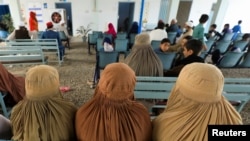Afghanistan's Taliban Wednesday urged Pakistan to review its plans to expel Afghan immigrants, rejecting charges the displaced community is involved in the security problems facing the neighboring country.
Taliban spokesman Zabihullah Mujahid released the statement a day after the Pakistani government ordered undocumented immigrants, including more than 1.7 million Afghans, to leave the country by November 1.
Interior Minister Sarfaraz Bugti told a news conference in Islamabad Tuesday that "illegal immigrants" who stay in Pakistan beyond the deadline would be arrested and deported to their respective countries.
"The behavior of Pakistan against Afghan refugees is unacceptable. The Pakistani side should reconsider its plan," Mujahid said on X, formerly Twitter.
"Afghan refugees are not involved in Pakistan's security problems. As long as they leave Pakistan voluntarily, that country should tolerate them," the Taliban spokesman wrote.
Bugti defended Pakistan’s crackdown on undocumented immigrants, saying that Afghan nationals carried out 14 of the 24 suicide bombings that have taken place in Pakistan this year. He added that eight of the 11 militants who recently raided two Pakistani military installations were Afghans.
"We are coming under attacks from Afghanistan, and we have evidence showing that Afghans are involved in the violence," the Pakistani minister said.
He clarified that more than 1.4 million Afghans residing in Pakistan as officially designated refugees and at least 850,000 Afghan citizen card holders are not the crackdown target.
Hafiz Muhibullah, the chief Taliban diplomat at Afghanistan's consulate in the northwestern city of Peshawar, said an entire community should not be punished for an individual’s criminal act.
Watch related video by Sarah Zaman:
"The hasty decision of forcing them out will create misunderstandings, and there is a fear that it will adversely affect the relations [between Afghanistan and Pakistan]," Muhibullah told VOA.
Islamabad says that fugitive leaders and militants of the outlawed Tehrik-i-Taliban Pakistan, or TTP, have moved to Afghanistan since the Taliban seized power there two years ago and have stepped up cross-border attacks.
The Taliban deny allowing the TTP or any other group to threaten other countries, particularly Pakistan, in line with their international counterterrorism commitments.
TTP-led insurgent attacks have killed more than 750 civilians and security forces in Pakistan in the first nine months of 2023, a 19% increase compared with the previous year.
The United Nations and human rights groups have expressed concerns over Pakistani plans to evict Afghan immigrants, saying those facing deportations include hundreds of thousands who fled Afghanistan after the Taliban reclaimed control of the country in August 2021, fearing persecution by the hardline de facto authorities.
The displaced community also refuses to return to Afghanistan, citing sweeping restrictions the Taliban have imposed on women's access to education and work.
Global concerns
"It's obviously a concerning development," U.N. spokesman Stephane Dujarric said at a news briefing Wednesday in New York when asked for a response to Pakistan's decision to expel Afghans. "As a matter of principle, it is critical that no refugees be sent back without it being a voluntary and dignified return."
Refugee International, an independent humanitarian organization advocating for better support for displaced people, said Wednesday it was "deeply troubled" by the announcement from Islamabad.
"Pakistan has a long history of generously hosting their Afghan neighbors when they have been unsafe. Now is not the time to stop," said Devon Cone, senior advocate for women and girls at the U.S.-based group.
"We are especially concerned about Afghans who fled their country after August 2021 due to direct and targeted threats from the Taliban," Cone noted. "They are at heightened risk of violence and reprisals from the Taliban. Expelling them back to Afghanistan would most likely result in their deaths."
Additionally, Amnesty International called on Pakistani authorities in a statement Wednesday to stop the crackdown on Afghans and to not deport them, asserting such a move could put them at grave risk.
"They are living incredibly precarious lives where they are either having to undergo arduous processes for registering as refugees in Pakistan or are stuck in lengthy processes waiting to obtain relocation to another country," said Nadia Rahman, Amnesty’s interim regional deputy director for research in South Asia.
Rahman reiterated Amnesty’s calls to the United Nations High Commission for Refugees to expedite registration and review applications from Afghans seeking international protection in Pakistan.
"The international community must act immediately to keep up their initial promises of providing protection to those fleeing persecution in Afghanistan."
VOA’s Urdu Service and VOA U.N. Correspondent Margaret Besheer contributed to this report.









